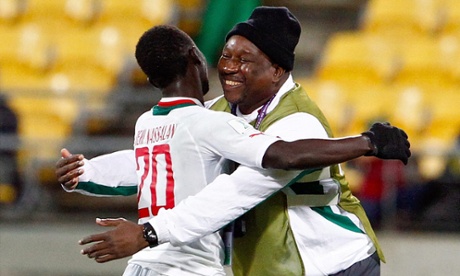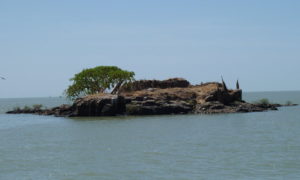In Sports:
In a way it was refreshing to hear the Germany manager dredging up that old canard about shootouts being a lottery. “We didn’t lose the match because of the opponent, we lost it because of penalties – at the end, it’s luck to win,” groaned Frank Wormuth after his side were sensationally eliminated by Mali in Sunday’s quarter-finals of the Under-20 World Cup. There was a time when defeat to an African team in a youth tournament would be quickly followed by grumbles of a different nature – about the dubious age of the victors, such as, famously, when the then Japan manager Philippe Troussier quipped after a 9-0 defeat to Nigeria’s Under-17s in 1999 that he saw one member of the winning team leaving the stadium “in a taxi with his wife and two kids”.
Now Mali’s achievement is widely applauded, as is that of Senegal, who have also made it to the last four of the tournament in New Zealand, raising the prospect of there being an all-African World Cup final. That has only happened once before at any level – when Nwankwo Kanu’s Nigeria beat Sammy Kuffour’s Ghana in the Under-17 tournament in 1993, after which poor, unsuspecting Pelé made his infamous prediction that the continent would soon be home to the senior World Cup winners. Bearing in mind that Fifa began using MRI scans in 2009 to help eradicate age fraud, which has long been prevalent in many parts of the world but especially in Africa, the current tournament is perhaps a more reliable indicator of progress.
“The country is starting to reap the rewards for careful, coherent player development,” says Ababacar Ndiaye, a coach at Excellence Foot, the Dakar-based academy that has provided three members of the Senegal squad that take on favourites Brazil in Wednesday’s semi-final. Such academies have proliferated in Senegal in the last decade, set up independently but now supported by a federation that realised the value of having a network of nurseries around the country.
Many academies now field teams in the national league, with Excellence Foot, which was founded in 2008, having a side in the second tier, along with Génération Foot (whose alumni include Sadio Mané and Diafra Sakho), while Diambars, among the first academies when it was co-founded by Patrick Vieira in 2000, now have a top-flight team and won the title in 2013.
“Much more emphasis has been put on player development in recent years and now every district or neighbourhood now has an academy,” say Ndiaye. “Players are reared properly from a young age, step by step. The three players [Abdoulaye Ndione, Moussa Ba and Moussa Wagué] who are with the Lionceaux [Lion Cubs] in New Zealand have been with us since they were 13.”
More than half of Senegal’s 21-man squad have been through academies in their country. One of those who was not, Mamadou Thiam, the scorer of the only goal in the quarter-final win over Uzbekistan, could be said to be an even more direct product of Senegalese football, the France-born Dijon striker being the son of Pape Idrissa Thiam, a former Senegal international, and the grandson of Abdoulaye Thiam, a former Senegal manager.
What has excited Senegalese supporters even more than the quality of this Under-20 team, however, has been their attitude. The Lionceaux have shown the doggedness and discipline that the country’s golden generation – El Hadji Diouf and company – were accused of losing after their 2002 World Cup exploits. A country that has become wearily accustomed to its footballers failing to live up to their billing has been pleasantly surprised by its youngsters’ ability to come back when all seems lost.
Senegal did not even look like qualifying for the tournament until Sidy Sarr scored twice in the last three minutes to claim a 4-3 win over Congo. They were then emphatically beaten in their first match at the finals, clobbered 3-0 by Portugal. But they have improved with each match, drawing with Colombia before beating Qatar, showing steel to oust a talented Ukraine side through a shootout and then outplaying Uzbekistan, Thiam crowning a dominant performance with a neat finish after a marvellous run and pass by Rémi Nassalan.

“They have a lot of quality but I’m not sure they are at the same level as Brazil, so they are definitely outsiders for that game,” says Ndiaye. “But they play with such tenacity and belief that it would be wrong to write them off.”
Mali will not be favourites in their semi either as Serbia already beat them, 2-0, in the group stages. But Hamidou Maiga did not play in the game after being sent off in the first match against Mexico for a mistimed lunge: the Serbs will find Mali a different proposition with the robust 6ft 6in centre-back in defence. And up front, the understanding between Adama Traoré and Dieudonné Gbakle has become clearer with each game.
The pair have either scored or created every Mali goal in the tournament so far, which is perhaps not surprising given that they are both graduates of the same academy in Bamako and are now both at Lille. The technically-excellent Traoré has already been compared to Seydou Keita, the former Lille and Barcelona player who captained Mali the only previous time they made it to the last four of this tournament (1999) and while there is a long list of players of all nationalities failing to live up to the potential they showed in youth tournaments (Dominic Adiyiah, the top scorer when Ghana became the first and so far only African country to win the Under-20 World Cup, signed for Milan straight after that tournament in 2009 but is now playing his club football in Thailand), Touré arrived in New Zealand on the back of an impressive breakthrough season in Ligue 1.
In Mali, where people have been getting up early every morning to follow their young team’s progress with pride, there is one old problem that folks want to see consigned to the past if these current crop of players are to continue bringing success. Outraged Malian media has carried reports of shoddy travel arrangements and the players receiving just 20,000 CFA francs (approx £22) spending money in New Zealand despite generous funding from the government, along with one jersey each, which they had to wash themselves after every match.
The federation has denied these reports and following the victory over Germany, which sparked huge celebrations back home, the cabinet director of the Malian Ministry for Sport, Youssouf Singaré, declared the players “can sleep easy” because “they will all get their bonuses, maybe even more”.
guardian.co.uk © Guardian News & Media Limited 2010
Published via the Guardian News Feed plugin for WordPress.







